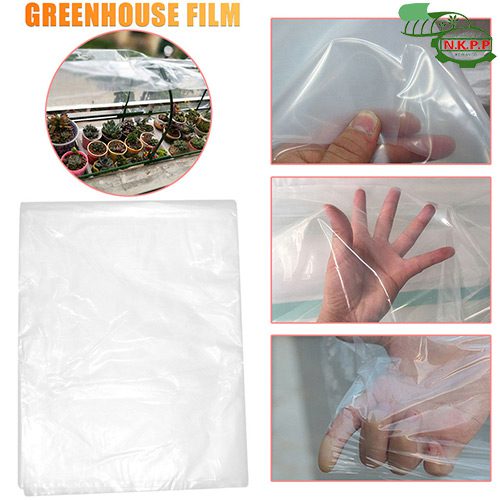Polyethylene plastic possesses several characteristics that make it an excellent choice for greenhouse covering. Its cost-effectiveness, large size, ease of attachment, and effective light transmission have led to its widespread use as the predominant material for greenhouses.
Since polyethylene plastic was first utilized for greenhouse applications in the early 1960s, there have been considerable improvements. The initial plastics were not very durable and often needed to be replaced each year. They struggled to endure structural wear and harsh weather conditions, and their lifespan was significantly shortened by exposure to ultraviolet (UV) rays from the sun.
Nowadays, greenhouse plastics provide a range of benefits. They are significantly less expensive than glass alternatives, with glass greenhouses typically costing around 40% more than those constructed entirely of plastic. Additionally, using plastic coverings can lead to energy savings of up to 30%. Furthermore, plastic coverings are straightforward to install and demand less effort.
Compared to glass, which is delicate and brittle, plastic offers many benefits. It has a long lifespan and can endure extreme conditions. Polycarbonate materials are even more durable over time and last longer than glass. This means they can withstand greater pressure.
Plastic coverings are also much easier to install than glass, saving time and effort. Now that you are familiar with greenhouse plastic and its benefits, let’s explore its lifespan and the factors affecting it.
How Long Does Greenhouse Plastic Last?
Thanks to advancements in plastic technology, the lifespan of greenhouse plastic has increased. Manufacturers now modify plastics—typically prone to rapid degradation in outdoor environments—by applying coatings, co-extrusion, or additives to extend their longevity. These advanced plastic products demonstrate superior performance and deteriorate more slowly when exposed to environmental elements, allowing them to last for several years outdoors.
Factors Affecting the Lifespan of Greenhouse Plastic
If you plan to use polyethylene plastic as your greenhouse covering, you should be aware of the factors that may affect its longevity. Understanding these factors will help you select the right greenhouse cover for maximum durability. Below are some key factors that determine how long your greenhouse plastic will last in outdoor conditions:
Exposure to UV Radiation
UV radiation from the sun accelerates the degradation and fading of standard plastic layers. The rate of deterioration and discoloration depends on the plastic’s UV stability and the presence of UV stabilizers, co-extrusion layers, and top coatings for protection.
To reduce UV exposure, consider the orientation of your greenhouse to the sun. Building the structure in a spot with less direct sunlight can help prolong the life of plastic covers.
Changes in Relative Humidity
Relative humidity refers to the amount of moisture in the air compared to the maximum moisture it can hold at a given temperature. Extremely high or low humidity levels can shorten the lifespan of greenhouse plastic.
High relative humidity leads to excess moisture, which can trigger harmful chemical reactions that degrade plastic. Conversely, low humidity in winter can cause plastic to dry out and deteriorate prematurely. To mitigate this, greenhouses with plastic covers should have humidity control systems, such as horizontal airflow fans, to remove excess moisture when necessary.
Temperature Fluctuations
High temperatures inside or outside the greenhouse can shorten the lifespan of plastic covers. Additives that filter radiant heat in the greenhouse covering, along with shading techniques, can significantly reduce heat stress and prevent premature degradation. Lowering heat buildup also helps maintain an optimal internal temperature for plant growth.
Does Thickness Affect the Lifespan of Agricultural Plastic?
Agriculture has advanced rapidly, incorporating more mechanical aspects than the traditional image of farming suggests. Farmers work hard and require durable equipment that can withstand environmental elements and frequent use.
Nylon, due to its resistance to heat, cold, UV radiation, and repeated use, is an excellent material for agricultural applications. This is why greenhouse plastic has a long lifespan.
Nylon can also endure harsh chemical environments, making it ideal for applications such as dairy barn scrubbers, chemical sprayers, and wear-resistant panels in greenhouses. Compared to metal, nylon is more effective and provides a cost-efficient solution for harvesting, milking, and other farming operations.
Regarding the impact of thickness on the lifespan of agricultural nylon, while thickness does play a role, it is not the most critical factor. Thin nylon is more susceptible to scratches and tears, but the material composition is far more important in determining longevity. Therefore, while thickness does have an effect, it is not significant enough to justify paying a high price for extra thickness alone.
Conclusion
In this article, we explored the lifespan of greenhouse plastics and the factors that affect their durability. Plastic is one of the best materials for building greenhouses. However, when choosing plastic materials, ensure you select a reputable supplier that guarantees the best quality products available in the market.
When selecting greenhouse plastic, consider your specific needs. Additionally, consulting experts in the field can help you make the best choice. If you have experience using agricultural nylon or greenhouse plastics, feel free to share your insights with us. Please also visit the Keyhan Plastic web page for more information about nylon and plastic.

